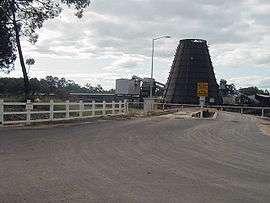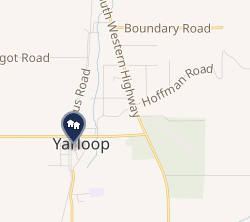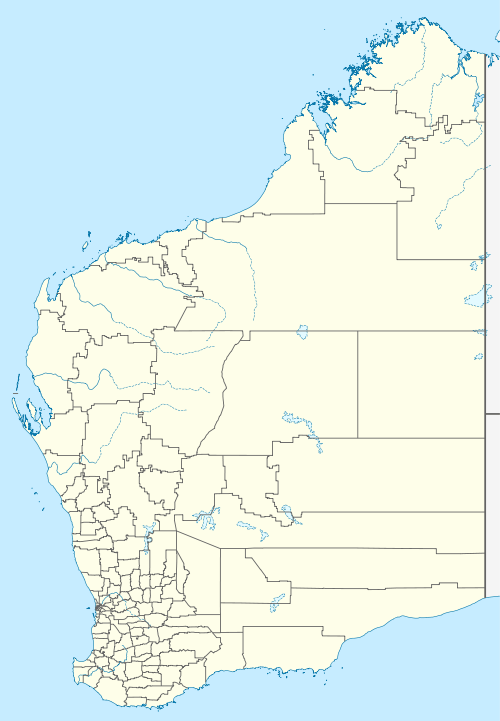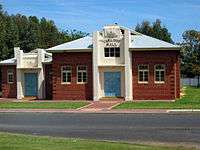Yarloop, Western Australia
Yarloop is a town in the South West of Western Australia along the South Western Highway, between Waroona and Harvey. At the 2016 census, Yarloop had a population of 395.[1] On 7 January 2016 a bushfire destroyed most of the town.[2]
| Yarloop Western Australia | |
|---|---|
 Timber mill at Yarloop in September 2001. | |

Yarloop is a town along the South Western Highway. | |
 Yarloop | |
| Coordinates | 32°57′18″S 115°54′00″E |
| Population | 395 (2016 census) |
| Established | 1894 |
| Postcode(s) | 6218 |
| Location | |
| LGA(s) | Shire of Harvey |
| State electorate(s) | Murray-Wellington |
| Federal Division(s) | Forrest |
History
The name Yarloop is said to have originated from the words "yard loop", the rail loop into the timber yard there. However, the name is more likely Aboriginal in origin (most likely from the local Bindjareb Noongar people). Yalup Brook is situated about 5 km (3.1 mi) north of Yarloop and there is similarity in pronunciation of the word, and the early spelling variations of the siding (Yailoup and Yarloup) support it being Aboriginal.[3]
In 1849, Joseph Logue arrived in the area and farmed at nearby Cookernup. He was followed by W.J. Eastcott, who used to collect river red gum bark and pit-sawn timber for other settlers, and John Bancells in 1886.
In 1894, Charles and Edwin Millar moved into the district looking to put nearby stands of jarrah to use - they had exported jarrah blocks to London for use in street paving. They soon established their own 300-acre (1.2 km2) timber town with accommodation and support facilities, located 2 km (1.2 mi) south of a government-surveyed town site as the company wished to maintain effective control over staff and workmen. However, not everyone working at the mill wanted to live in the facilities, so a company town on the eastern side of the railway and a public town on the western side developed. A siding on the Perth-Bunbury Railway came into being in 1896.
In 1901, they made Yarloop the centre of their operations, and the town became even more important when in 1905 they closed their Denmark mills on the south coast. At their peak, they employed over 500 people in the Yarloop area. By the 1930s, they boasted the largest private railway in the world with eight railway systems and 25 locomotives. The timber mill, originally known as the Waigerup mill, still operates and in 1984 the mill town was classified as a conservation area by the National Trust[4] and is now protected by the Yarloop Conservation Plan (1998) administered by the Heritage Council.[5]
The town was gazetted in 1962.[3][6]

Modern era
Yarloop became home to citrus growers, dairy farmers, vegetable growers and commuters. Until the bushfire of 2016, the town centre included many restored timber buildings along with the historical steam workshops. The workshops had many operating steam engines along with displays of the equipment used to maintain 25 steam locos and the timber production of millers. There is a heritage trail around the old mill town and conservation area. Facilities included a primary school, local shop, bowling club, hotel, post office, community centre and various types of accommodation.
A notable issue in the town was alleged emissions from the Alcoa alumina refinery at nearby Wagerup. For years, some residents have reported illnesses such as respiratory irritation, frequent blood noses, headaches, nausea and cancer, as reported in numerous media outlets, including the Four Corners program "Something In The Air",[7] although no formal causal link has ever been established. These claims are also disputed by a large section of the local population. Alcoa subsequently obtained permission (September 2006) to double the size of the refinery to become the biggest such refinery in the world, although very strict conditions have been imposed on the expansion by the Health and Environment departments. A minority of the residents announced plans to fight the decision in the Supreme Court.[8][9][10]
2016 bushfire
On 7 January 2016, 121 homes[11] were destroyed by a massive bushfire.[2] Over a seven-minute period, the fire also burned the historic timber workshops, factories, an old church, the old hospital, shops, the hotel, fire station and a part of the school.[12] Local politician Murray Cowper, observing soon afterwards that the town now looked "very surreal",[13] said: "This could well be the end of the town."[2][14] Those visiting the town after the fire described the level of destruction as "apocalyptic".[15] However, Western Australia's Premier Colin Barnett said that the town would be rebuilt, and a majority of residents voted in favour of rebuilding.[16][17] On 9 January the remains of two men were found in burnt-out houses.[11]
Public access to Yarloop was restored on 11 August 2016, seven months after the fire, when roadblocks were removed.[18]
Rebuilding
A new community centre was built, incorporating the facade of the original town hall, and opened in November 2019.[19]
Transport
Yarloop is situated on the South Western Railway, and is a stopping place for the Australind passenger train from Perth to Bunbury
| Preceding station | Following station | |||
|---|---|---|---|---|
| Waroona towards Perth |
Australind | Cookernup towards Bunbury | ||
References
- "2016 Census QuickStats: Yarloop". quickstats.censusdata.abs.gov.au. Retrieved 2 June 2019.
- "Massive bushfire destroys Western Australia town". BBC News. BBC. Retrieved 8 January 2016.
- Western Australian Land Information Authority. "History of country town names – Y". Retrieved 17 April 2007.
- "Yarloop". Australia for everyone. Retrieved 8 January 2016.
- The Sydney Morning Herald (8 February 2004). "Yarloop". Retrieved 6 October 2006.
- Shire of Harvey. "Local Towns - Yarloop". Archived from the original on 20 July 2011. Retrieved 6 October 2006.
- "Something in the air". Four Corners. Australian Broadcasting Corporation. 3 October 2005. Retrieved 8 January 2016.
- Flint, John (8 September 2006). "Hamel, Cookernup and Yarloop in the firing line". The Sunday Times. Archived from the original on 13 August 2011. Retrieved 5 October 2006 – via perthnow.com.au.
- News.com.au (15 September 2006). "Alcoa to be biggest in world". news.com.au. Archived from the original on 9 September 2012.
- "Protesters plan to lodge Supreme Court writ over Alcoa smelter". ABC News Online. 15 September 2006. Retrieved 9 January 2015.
- "WA fires: Emergency warning for Harvey, Waroona, Hamel, Cookernup and Yarloop". WA Today. 9 January 2016. Retrieved 9 January 2016.
- Hiatt, Bethany (28 January 2017). "Yarloop kids happy to return to school". The West Australian. Perth, Western Australia. Retrieved 5 June 2019.
- "WA fire: Yarloop local MLA Murray Cowper describes 'very surreal' scene, estimates 80pc of homes lost". Australian Broadcasting Corporation. 8 January 2016. Retrieved 8 January 2016.
- "WA fire: Yarloop devastated by bushfire with 95 homes lost, three people missing now found". Australian Broadcasting Corporation. 8 January 2016. Retrieved 8 January 2016.
- "Live: WA bushfire threatens several towns, residents warned to evacuate". Australian Broadcasting Corporation. 9 January 2016. Retrieved 9 January 2016.
- "Australia bushfire: Two killed as blaze rages unabated". BBC News. 9 January 2016. Retrieved 9 January 2016.
- Croy, Liam. "Forrest offers help to get town rebuilt". The West Australian. Seven West Media. Archived from the original on 27 January 2016. Retrieved 21 January 2016.
- Stewart, Anthony (12 August 2016). "Roads into Yarloop reopen seven months after historic settlement destroyed by bushfire". ABC News. Retrieved 12 August 2016.
- Laura Birch, Jacqueline Lynch and Holly Ferguson (22 November 2019). "Rising from the ashes, Yarloop bounces back after devastating bushfires in 2016". Australian Broadcasting Corporation. Retrieved 22 November 2019.CS1 maint: uses authors parameter (link)
External links
- Map of Yarloop (Shire of Harvey)
- Aerial footage of Yarloop on the morning of 8 January 2016
- "Reframing Rural Fire Management": Report of the Special Inquiry Into the January 2016 Waroona Fire WA Governmenr-Waroona Fire Special Enquiry. 29 April 2016. Retrieved 11 August 2016–via www.documentcloud.org.